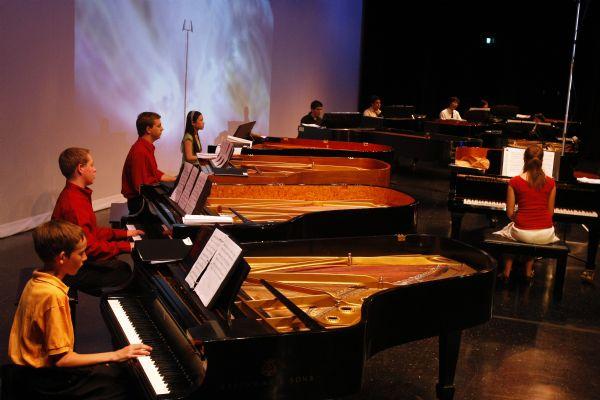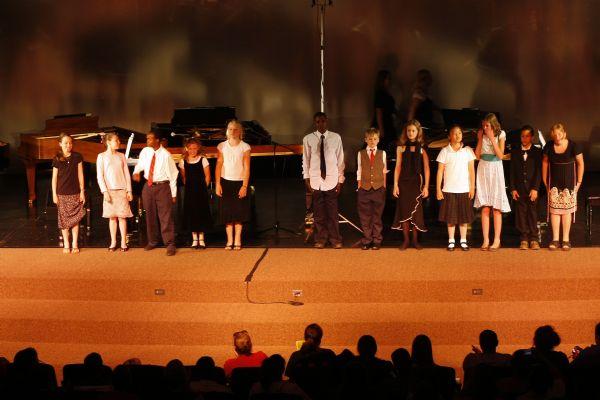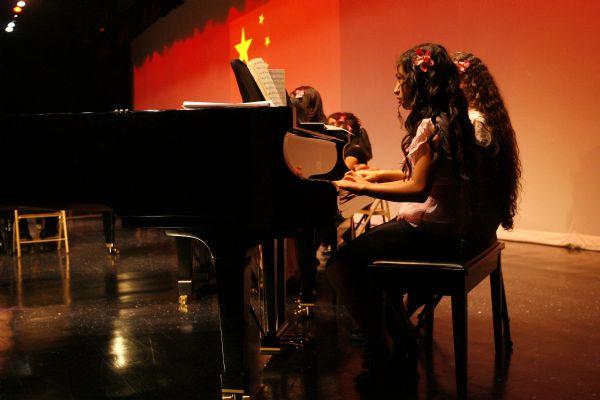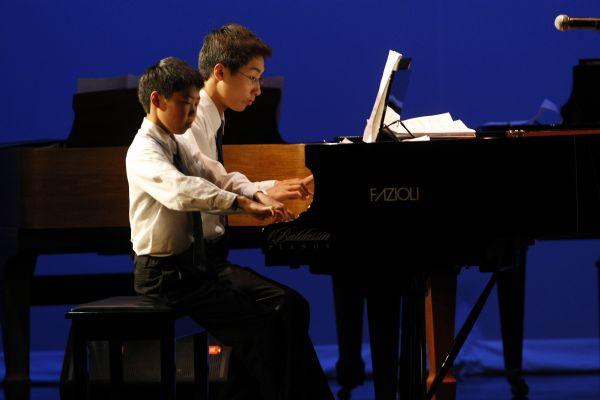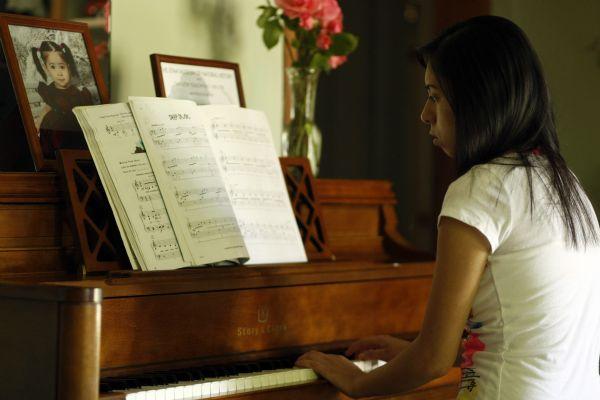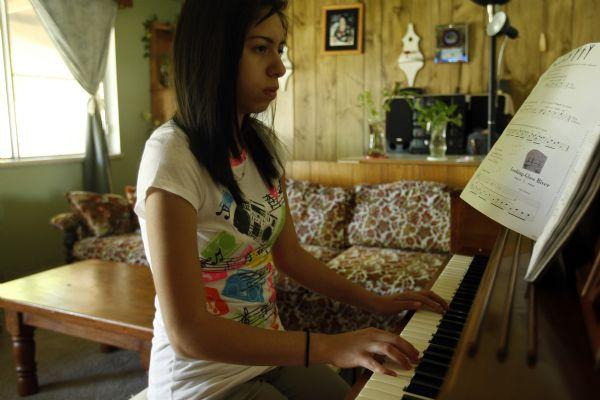This is an archived article that was published on sltrib.com in 2009, and information in the article may be outdated. It is provided only for personal research purposes and may not be reprinted.
Music moves Jimena Arellano. It's not easy for her to describe the feeling, but playing the piano gives her the emotional outlet she craves.
"When I play a certain type of music, sometimes the way I play it is like the way I feel," Jimena said. "I just feel connected. I feel like I can express my feelings through music."
Jimena's need for self-expression found a positive channel because there's now a piano in her Glendale home -- a piano that wouldn't be there without the help of the Mundi Project, a new Salt Lake City nonprofit arts group.
Playing the piano has changed her daily life, changed the company she keeps, made her a more responsible person and brightened her hopes for the future, said Jimena, who just finished her junior year at East High.
The budding musician spends free time hanging out in East High's piano lab and performs in music events organized by the Mundi Project. "The friends that I have are also musical," said Jimena, who hopes to attend the University of Utah and is considering majoring in music. "They play instruments like piano, violin and guitar. It's cool because we can connect that way."
Her love for music found its first outlet at Whittier Elementary's piano lab, where teachers noticed her talent and dedication. While she was in junior high school, the Mundi Project matched her with a private piano teacher willing to waive lesson fees and placed a donated piano in her home.
"I had only a small toy keyboard," Jimena said. "Having the piano made a big difference. I wanted a piano, but my family couldn't afford it. It was great that I could get one."
Jimena's parents, immigrants from Mexico, are thrilled to have the piano in their home and pleased that she and her sister are learning to play it.
"If I hadn't been involved in the programs at school, I would have never thought of playing the piano," Jimena said. "They didn't tell me they wanted me to play. I got interested by myself. Now my mom encourages me to keep going, and my dad, too."
Jimena is one of the Mundi Project's first success stories, said the group's founder, Hana Janatova, who said some 70 youths have received piano training. The innovative nonprofit arts group takes its name from the Latin word meaning "world," and its mission -- teaching the world to love music -- is just as lofty.
Janatova is a piano teacher and performer who grew up mostly in Salt Lake City and holds a piano performance degree from University of Arizona. Her life revolves around the piano. She founded the Mundi Project about five years ago because of her belief that music education changes lives.
"Music, alongside with math, is a universal language that has the ability to open hearts, expand minds and develop character," Janatova said. "In a time where funding is being cut in the arts, piano education is crucial in developing future generations of world citizens. If everyone was fluent in this universal language, I sincerely believe that the world would be a better place."
The Mundi Project takes a two-pronged approach, beginning with its Piano Ambassador program, offering music workshops and performances that "harmonize the community" by bringing students of varying socio-economic levels together. Then there's its Piano Bank, which since July 2008 has donated 15 pianos, including a parlor grand piano for Glendale's Sorenson Unity Center, keyboards for Salt Lake Arts Academy charter school and pianos in private homes.
"The piano is a very expensive instrument, even to rent," Janatova said. "I see pianos sitting in homes where people don't play them -- and pianos thrive on being played. How about if people donated a piano, just as they do a car for the Lung Association? And donated it to a child who could use it in personal study?"
Piano recipients are selected by a committee on the basis of financial need, recommendations from teachers and the student's desire and commitment to take lessons. Lessons can be provided by teachers who accept students on partial or full scholarship, or through public-school piano labs.
Pianos must be in reasonably good condition to be accepted, Janatova said, although Mundi makes certain that the pianos are tuned and repaired after moving, with the help of piano technicians who volunteer a portion of their services.
Mundi's Piano Ambassador program sponsors piano "monster concerts" and multidisciplinary arts workshops and performances in the Salt Lake City area. At a three-week workshop last summer, Janatova recalls the experience of two Somali refugees.
"They were very shy and hesitant to talk to the teachers or kids," Janatova said. "But at the end of three weeks, they were performing at the Rose Wagner Center -- dancing their hearts out and creating visual art. These two girls from a war-torn region of the world were given an opportunity to experience the arts and create friendships with other children in this community. It will be a lifelong memory for them. We need this. The arts are being cut in our schools, and kids need this."
Janatova has received some grant money to defray the cost of programming and performances. But charitable foundations balk at supporting the Piano Bank's costs for moving, repairing and tuning donated pianos when they are placed in private homes, she said.
"The Piano Bank is one of the greatest ideas we have, but one of the hardest to fund," Janatova said. To make up the difference, the Mundi Project offers benefit concerts and Play-A-Thons and happily accepts private donations of cash as well as used pianos.
For Jimena Arellano, such generosity has been life-changing, and she wishes she could thank the donor who made it possible for her to enjoy a piano at home. "I personally don't know who was the one who donated it," she said, "but when I saw the piano coming to my house, I was so happy and grateful."
The Mundi Project is a charitable organization that places donated pianos in public meeting places or with families that need them. The group also creates innovative piano performance and education opportunities along the Wasatch Front for students of various backgrounds and skill levels.
Cooperates with »The Mundi Project complements other groups working to bolster music offerings for at-risk students, such as the Youth Enrichment Foundation, which has created piano labs in several Salt Lake City public schools, and the University of Utah piano program, which staffs the labs with piano teacher interns.
Donations » If you own a piano in good condition that's not being played, you can receive a tax deduction by donating it to the Mundi Project. For information, visit http://www.mundiproject.org" Target="_BLANK">http://www.mundiproject.org.
Information » Families in financial need can fill out an application to receive a piano found at the Web site, which also contains a listing of upcoming performance and workshop events.
Ten tips for helping your child be successful in learning to play the piano
1 » The study of piano increases a child's imagination through musical self-expression and increases self-discipline and concentration.
2 » Create a suitable learning environment away from distractions, such as TV and cell phones. Create piano time to open the door to musical exploration.
3 » Choose a piano teacher based on qualifications and referrals, not on location. This is not real estate.
4 » A piano teacher is one of the greatest motivators in a child's study. Interview to find a good fit for your child.
5 » Maintain your piano regularly as the seasons change. It's an investment.
6 » Become involved in your child's piano pursuits. Encourage and support strong practice and performing habits that will last a lifetime.
7 » Piano education doesn't stop at the piano lesson. Help your child set goals, not watch the clock, in order to achieve new skills, build self-esteem and encourage self-motivation.
8 » Instill a love and appreciation of music in your child's daily life by attending piano recitals and concerts and listening to varieties of music in your home.
9 » The study of piano is a strong foundation for all other musical pursuits. The keyboard range of the piano encompasses the ranges of all the musical instruments found in an orchestra.
10 » Consistency in study is the key to nurturing good habits that affect all other aspects of life.
-- from Hana Janatova, founder and executive director of the Mundi Project


